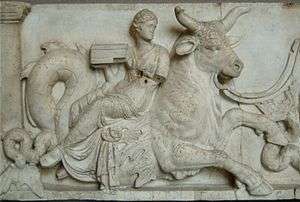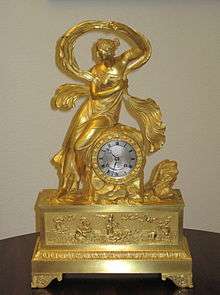Nereid
In Greek mythology, the Nereids (/ˈnɪəriɪdz/ NEER-ee-idz; Greek: Νηρηΐδες Nereides, sg. Νηρηΐς Nereis) are sea nymphs (female spirits of sea waters), the 50 daughters of Nereus and Doris, sisters to their brother Nerites.[1] They often accompany Poseidon, the god of the sea, and can be friendly and helpful to sailors (such as the Argonauts in their search for the Golden Fleece).
%2C_modern-day_Antalya_Province%2C_Turkey._390-380_BCE._Room_17%2C_the_British_Museum%2C_London.jpg)
Mythology

Nereids are particularly associated with the Aegean Sea, where they dwelt with their father Nereus in the depths within a golden palace.[1] The most notable of them are Thetis, wife of Peleus and mother of Achilles; Amphitrite, wife of Poseidon and mother of Triton; and Galatea, the vain love interest of the Cyclops Polyphemus.
| Greek deities series |
|---|
| Aquatic deities |
| Nymphs |
They symbolized everything that is beautiful and kind about the sea. Their melodious voices sang as they danced around their father. They are represented as very beautiful girls, crowned with branches of red coral and dressed in white silk robes trimmed with gold, but who went barefoot. They were part of Poseidon's entourage and carried his trident.
In Homer's Iliad XVIII, when Thetis cries out in sympathy for the grief of Achilles for the slain Patroclus, her sisters appear. The Nereid Opis is mentioned in Virgil's Aeneid. She is called by the goddess Diana to avenge the death of the Amazon-like female warrior Camilla. Diana gives Opis magical weapons for revenge on Camilla's killer, the Etruscan Arruns. Opis sees and laments Camilla's death, and kills Arruns with an arrow in revenge as directed by Diana.[2]
Modern use
In modern Greek folklore, the term "nereid" (νεράιδα, neráida) has come to be used for all nymphs, fairies, or mermaids, not merely nymphs of the sea.[3]
Nereid, a moon of the planet Neptune, is named after the Nereids. Nereid Lake in Antarctica is named after the nymphs.[4]
Names

This list is correlated from four sources: Homer's Iliad,[5] Hesiod's Theogony,[6] the Bibliotheca of Pseudo-Apollodorus[7] and the Fabulae of Hyginus.[8] Because of this, the total number of names goes beyond fifty.[9]
| No. | Name | Sources | ||||
|---|---|---|---|---|---|---|
| Hom. | Hes. | Ps-Apol. | Hyg. | Others | ||
| 1 | Actaea | ✓ | ✓ | ✓ | ✓ | |
| 2 | Agaue | ✓ | ✓ | ✓ | ✓ | |
| 3 | Amatheia | ✓ | ✓ | |||
| 4 | Amphinome | ✓ | ✓ | |||
| 5 | Amphithoe | ✓ | ✓ | |||
| 6 | Amphitrite | ✓ | ✓ | |||
| 7 | Apseudes | ✓ | ✓ | |||
| 8 | Arethusa | ✓ | ||||
| 9 | Asia | ✓ | ||||
| 10 | Autonoe | ✓ | ✓ | |||
| 11 | Beroe | ✓ | ||||
| 12 | Callianassa | ✓ | ✓ | |||
| 13 | Callianeira | ✓ | ||||
| 14 | Calypso | ✓ | ||||
| 15 | Ceto | ✓ | ||||
| 16 | Clio | ✓ | ||||
| 17 | Clymene | ✓ | ✓ | |||
| 18 | Cranto | ✓ | ||||
| 19 | Creneis | ✓ | ||||
| 20 | Cydippe | ✓ | ||||
| 21 | Cymo | ✓ | ✓ | |||
| 22 | Cymatolege | ✓ | ||||
| 23 | Cymodoce | ✓ | ✓ | ✓ | ||
| 24 | Cymothoe | ✓ | ✓ | ✓ | ✓ | |
| 25 | Deiopea | ✓ | ||||
| 26 | Dero | ✓ | ||||
| 27 | Dexamene | ✓ | ✓ | |||
| 28 | Dione | ✓ | ||||
| 29 | Doris | ✓ | ✓ | ✓ | ||
| 30 | Doto | ✓ | ✓ | ✓ | ||
| 31 | Drymo | ✓ | ||||
| 32 | Dynamene | ✓ | ✓ | ✓ | ✓ | |
| 33 | Eione | ✓ | ✓ | |||
| 34 | Ephyra | ✓ | ||||
| 35 | Erato | ✓ | ✓ | |||
| 36 | Euagore or Evagore | ✓ | ✓ | |||
| 37 | Euarne | ✓ | ||||
| 38 | Eucrante | ✓ | ✓ | |||
| 39 | Eudore | ✓ | ✓ | |||
| 40 | Eulimene | ✓ | ✓ | |||
| 41 | Eumolpe | ✓ | ||||
| 42 | Eunice | ✓ | ✓ | |||
| 43 | Eupompe | ✓ | ||||
| 44 | Eurydice | ✓ | ||||
| 45 | Galene | ✓ | ||||
| 46 | Galatea | ✓ | ✓ | ✓ | ✓ | |
| 47 | Glauce | ✓ | ✓ | ✓ | ||
| 48 | Glauconome | ✓ | ✓ | |||
| 49 | Halie | ✓ | ✓ | ✓ | ||
| 50 | Halimede | ✓ | ✓ | |||
| 51 | Hipponoe | ✓ | ✓ | |||
| 52 | Hippothoe | ✓ | ✓ | |||
| 53 | Iaera | ✓ | ✓ | |||
| 54 | Ianassa | ✓ | ✓ | |||
| 55 | Ianeira | ✓ | ✓ | |||
| 56 | Ione | ✓ | ||||
| 57 | Iphianassa | ✓[10] | ||||
| 58 | Laomedeia | ✓ | ||||
| 59 | Leiagore | ✓ | ||||
| 60 | Leucothoe | ✓ | ||||
| 61 | Ligea | ✓ | ||||
| 62 | Limnoreia | ✓ | ✓ | ✓ | ||
| 63 | Lycorias | ✓ | ||||
| 64 | Lysianassa | ✓ | ✓ | |||
| 65 | Maera | ✓ | ✓ | |||
| 66 | Melite | ✓ | ✓ | ✓ | ✓ | |
| 67 | Menippe | ✓ | ||||
| 68 | Nausithoe | ✓ | ||||
| 69 | Nemertes | ✓ | ✓ | ✓ | ||
| 70 | Neomeris | ✓ | ||||
| 71 | Nerea | ✓[11] | ||||
| 72 | Nesaea | ✓ | ✓ | ✓ | ✓ | |
| 73 | Niso | ✓ | ||||
| 74 | Opis | ✓ | ||||
| 75 | Oreithyia | ✓ | ✓ | |||
| 76 | Panopea | ✓ | ||||
| 77 | Panope | ✓ | ✓ | ✓ | ||
| 78 | Pasithea | ✓ | ||||
| 79 | Pherusa | ✓ | ✓ | ✓ | ✓ | |
| 80 | Phyllodoce | ✓ | ||||
| 81 | Plexaure | ✓ | ||||
| 82 | Ploto | ✓ | ||||
| 83 | Polynome | ✓ | ||||
| 84 | Pontomedusa | ✓ | ||||
| 85 | Pontoporeia | ✓ | ||||
| 86 | Poulynoe | ✓ | ||||
| 87 | Pronoe | ✓ | ||||
| 88 | Proto | ✓ | ✓ | ✓ | ✓ | |
| 89 | Protomedeia | ✓ | ||||
| 90 | Psamathe | ✓ | ✓ | |||
| 91 | Sao | ✓ | ✓ | |||
| 92 | Speio | ✓ | ✓ | ✓ | ✓ | |
| 93 | Thaleia | ✓ | ✓ | |||
| 94 | Themisto | ✓ | ||||
| 95 | Thetis | ✓ | ✓ | ✓ | ||
| 96 | Thoe | ✓ | ✓ | ✓ | ||
| 97 | Xantho | ✓ | ||||
| Number of Nereids | 34 | 50 | 45 | 47 | 2 | |
References
- Atsma, Aaron J. "Nereides". Theoi Project Greek Mythology. Retrieved 7 March 2016.
- Virgil: His life and times by Peter Levi, Duckworth, 1998
- Zervas, Theodore G. (2016). Formal and Informal Education During the Rise of Greek Nationalism: Learning to be Greek. Springer. p. 121. ISBN 9781137484154.
- Nereid Lake. SCAR Composite Gazetteer of Antarctica
- Homer. Iliad, Book 18.39-51
- Hesiod. Theogony 240-262
- Pseudo-Apollodorus. Bibliotheca, 1.2.7
- Gaius Julius Hyginus. Fabulae, Preface
- Parada, Carlos. "Nereids". Greek Mythology Link. Retrieved 7 March 2016.
- Lucian, Dialogues of the Sea-Gods, 14
- Valerius Flaccus, Argonautica, 1. 450
External links
| Wikimedia Commons has media related to Nereids. |